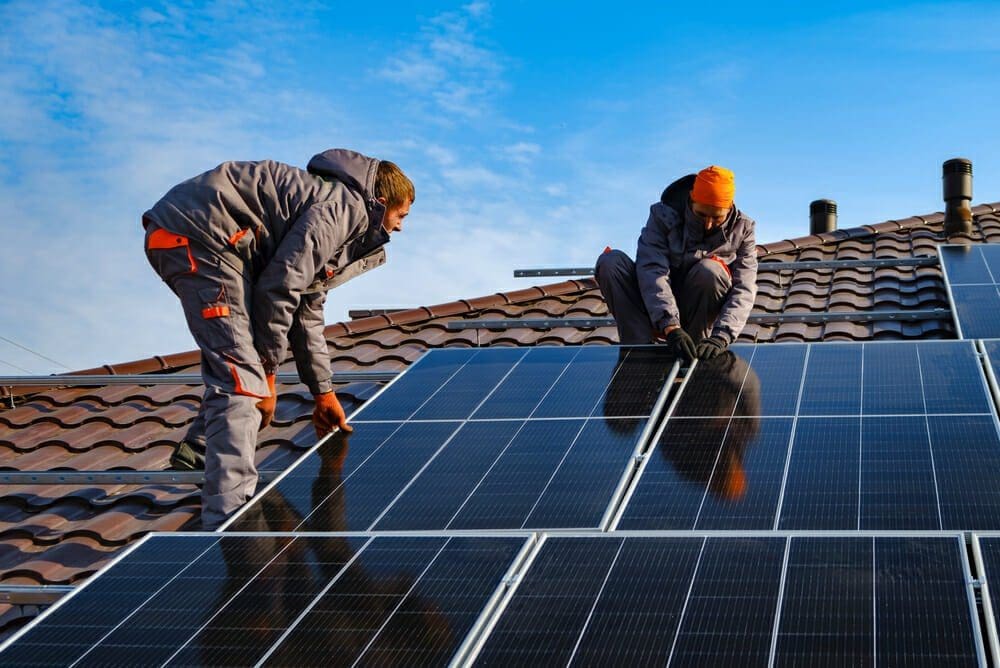The advantages of solar panels for homes extend beyond just clean energy; they also offer substantial savings. Solar panels harness the power of the sun to generate electricity, providing homeowners with a renewable and eco-friendly energy source.
Simultaneously, they contribute to significant financial benefits by reducing utility bills and even allowing homeowners to earn money through incentives like net metering. In this introduction, we’ll explore how solar panels provide clean energy and bring about substantial savings for households.

Table of Contents
Environmental Benefits of Solar Panel Installation for Green Homes
Solar panel installation in green homes offers a range of environmental benefits, contributing to the reduction of greenhouse gas emissions and the overall sustainability of our planet. Here are some key environmental advantages of using solar panels for homes:
Reduction in Greenhouse Gas Emissions
Solar panels generate electricity without emitting harmful greenhouse gases such as carbon dioxide (CO2), responsible for global warming and climate change. By using solar power, green homes can significantly reduce their carbon footprint.
Renewable Energy Source
Solar energy is a renewable resource, meaning it is virtually inexhaustible as long as the sun continues to shine. Unlike finite fossil fuels, which contribute to environmental degradation when extracted and burned, solar power is sustainable and doesn’t deplete natural resources, so solar panels for homes are a sound option.
Reduced Air and Water Pollution
Traditional energy sources like coal and natural gas release pollutants into the air and water when burned. Solar panels for homes, on the other hand, produce clean electricity without emitting harmful pollutants, helping to improve air and water quality.
Conservation of Natural Resources
Solar energy reduces the demand for non-renewable resources like coal, oil, and natural gas, often extracted through environmentally destructive processes. Solar panels for homes help conserve these valuable resources for future generations.
Lower Energy Consumption
Green homes are typically designed with energy-efficient features, and solar panels complement these efforts by producing clean energy on-site. This reduces the need to rely on energy from fossil fuel power plants, which are less efficient and more environmentally damaging.
Mitigation of Urban Heat Islands
Solar panels for homes can shade buildings, reducing the urban heat island effect in densely populated areas. This effect occurs when cities absorb and retain heat, leading to higher temperatures. Solar panels help mitigate this effect by shading buildings and reducing energy consumption.
Preservation of Ecosystems
Solar panel installations typically require less land than traditional power plants, such as coal or natural gas facilities. This reduces habitat disruption, land degradation, and deforestation, helping to protect ecosystems and biodiversity.
Energy Independence
Green homes equipped with solar panels are less dependent on centralized power grids, which may rely on fossil fuels. This enhances energy security and reduces vulnerability to supply disruptions or price fluctuations in the energy market.
Long Lifespan and Low Maintenance
Solar panels have a long lifespan (typically 25-30 years or more) and require minimal maintenance. This longevity reduces the environmental impact associated with manufacturing and disposing of short-lived energy technologies.
Educational and Awareness Benefits
Installing solar panels on green homes can serve as a visible example of sustainable living. It can inspire neighbors and communities to adopt clean energy practices and contribute to a broader cultural shift toward environmental stewardship.
Economic Advantages of Solar Panel Installation
Solar panel installation offers several economic advantages for homeowners and businesses alike. These benefits not only make solar energy an environmentally friendly choice but also a financially savvy one. Here are some key economic advantages of solar panel installation:

Reduced Energy Bills
One of the most immediate economic benefits of solar panels is the reduction in energy bills. Solar systems generate electricity from sunlight, offsetting or even eliminating the need to purchase electricity from the grid. This can lead to substantial savings over the lifespan of the solar panels.
Return on Investment (ROI)
Solar panel installations typically have a favorable ROI. While there is an initial upfront cost, the savings on energy bills and potential incentives often result in a payback period of several years, after which homeowners or businesses can enjoy free electricity for the remaining lifespan of the solar panels.
Net Metering
Many regions offer net metering programs, allowing solar panel owners to return excess electricity to the grid. This means that during periods of excess generation, homeowners can earn credits or receive payments for the surplus energy they produce, further enhancing the economic benefits.
Incentives and Tax Credits
Governments and local utilities often provide financial incentives, rebates, and tax credits to encourage solar panel installations. These incentives can significantly reduce the upfront cost and improve the overall financial picture.
Increased Property Value
Homes and businesses with solar panel installations tend to have higher property values. Potential buyers are attracted to lower energy bills and the environmental benefits of solar energy, which can make a property more appealing and increase its resale value.
Protection Against Rising Energy Costs
Solar panels offer a degree of protection against future increases in energy prices. By generating your electricity on-site, you are less vulnerable to fluctuations in utility rates, providing long-term stability in energy costs.
Final Words
In conclusion, the environmental benefits of solar panel installation for green homes are substantial and play a crucial role in fostering sustainability and reducing our carbon footprint. By harnessing clean, renewable energy from the sun, homeowners contribute to a healthier planet and enjoy various financial advantages, including reduced energy costs and increased property value.
Embracing solar power isn’t just an investment in your home; it’s an investment in a more sustainable future for our planet. As we move towards a greener and more environmentally-conscious world, solar panels continue to be a shining beacon of hope for a cleaner and brighter tomorrow.
FAQs
Are There Any Government Incentives Or Rebates For Installing Solar Panels On Homes?
Yes, many governments offer tax credits, rebates, and incentives to encourage residential solar panel installation, which can significantly reduce the initial investment cost.
How Do Solar Panels Contribute To Energy Independence?
Solar panels allow homeowners to generate their electricity, reducing dependence on external energy sources and providing security during power outages.
Do Solar Panels Increase The Value Of My Home?
Yes, solar panels typically increase property value as they are seen as eco-friendly upgrades, making your home more attractive to eco-conscious buyers.
What Is The Lifespan Of Solar Panels, And Do They Require A Lot Of Maintenance?
Solar panels have a 25-30 years or more lifespan, requiring minimal maintenance. Periodic cleaning and occasional inspections are usually sufficient to ensure their optimal performance.
What Happens If My Solar Panels Produce More Electricity Than I Use?
Excess electricity can be fed back into the grid, often earning you credits through net metering, which can further reduce your energy bills.
Will Solar Panels Work During Cloudy Or Rainy Days?
Solar panels can still generate electricity during cloudy or rainy days, although their efficiency may be lower than on sunny days. You remain connected to the grid for power during such periods.
